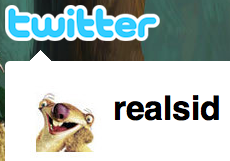Childish misconceptions
Have you ever wished you could know what a baby was thinking? After they’ve begun to develop language, we get to peek inside their toddler minds. As children grow, they make continual refinements to their model of the world. Along the way, they come up with some pretty funny misconceptions. I think this is part of the process of learning in general. Misconceptions are essential stepping stones to learning.
 Last year is when I dropped the bombshell. I told Lucas (3) that Sid from Ice Age was not actually real. I then proceeded—cold-hearted father that I am—to show him an interview with John Leguizamo on YouTube. Lucas had a sort of stunned look on his face as his brain scrambled to make sense of what he was witnessing. “That’s clearly Sid’s voice…but that’s not Sid…” It took him a few minutes of follow-up questions and explanations before he finally accepted that Sid was a fictional character. I felt mean, but I also liked that he had this newfound realization. The next thing he asked, looking to me for reassurance, was “But Diego—he’s real, right?” I think I may have (or at least should have) waited until the next day to introduce him to Denis Leary. You can only take so much world-shaking in a day.
Last year is when I dropped the bombshell. I told Lucas (3) that Sid from Ice Age was not actually real. I then proceeded—cold-hearted father that I am—to show him an interview with John Leguizamo on YouTube. Lucas had a sort of stunned look on his face as his brain scrambled to make sense of what he was witnessing. “That’s clearly Sid’s voice…but that’s not Sid…” It took him a few minutes of follow-up questions and explanations before he finally accepted that Sid was a fictional character. I felt mean, but I also liked that he had this newfound realization. The next thing he asked, looking to me for reassurance, was “But Diego—he’s real, right?” I think I may have (or at least should have) waited until the next day to introduce him to Denis Leary. You can only take so much world-shaking in a day.
A misconception I had when growing up had to do with chewing gum in bed. My mom told me that I mustn’t go to bed with gum in my mouth, because it might end up in my hair. I always wondered at this mysterious process—how the gum would work its way deeper into my mouth, up through my head, out through my skull, and into my hair. In any case, I didn’t want to test it out.
And then there are the verbal idioms we pick up without having any idea what their origin is. This is fine except when we don’t get it quite right. Oftentimes, these don’t surface until we write them on paper. My mom used the phrase “for all intents and purposes” quite a bit. So did I. Except that I always said, “for all intensive purposes.” It pretty much sounds the same when you say it out loud. The fun thing with Google is that you can find other people making the same mistake you made. I didn’t realize my mistake until college, but Google reassures me that there are about 406,000 other people making the same mistake, so I don’t feel so dumb.
Misconceptions are a part of life and learning. They can be funny sometimes. Do you have any favorite misconceptions or delusions you’ve labored under for some part of your life? Or stories about how your kids have made humorous conclusions about what’s true or how things work?
It looks like you're new here. You may want to sign up for email alerts or subscribe to the "Lenz on Learning" RSS feed. Thanks for reading.

